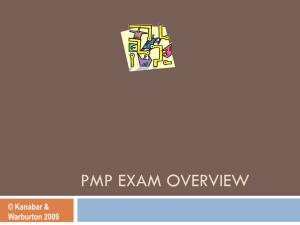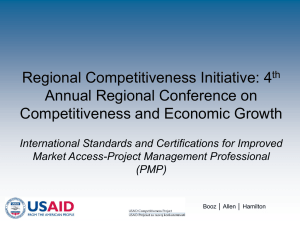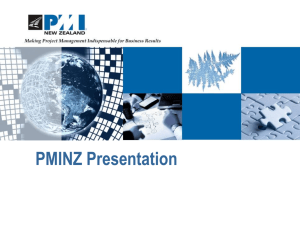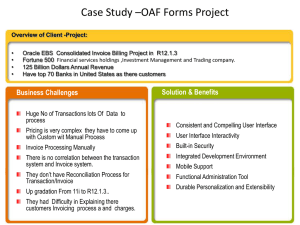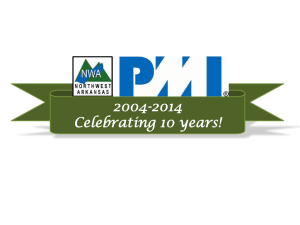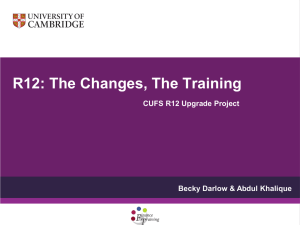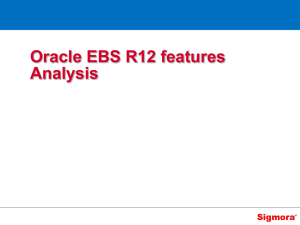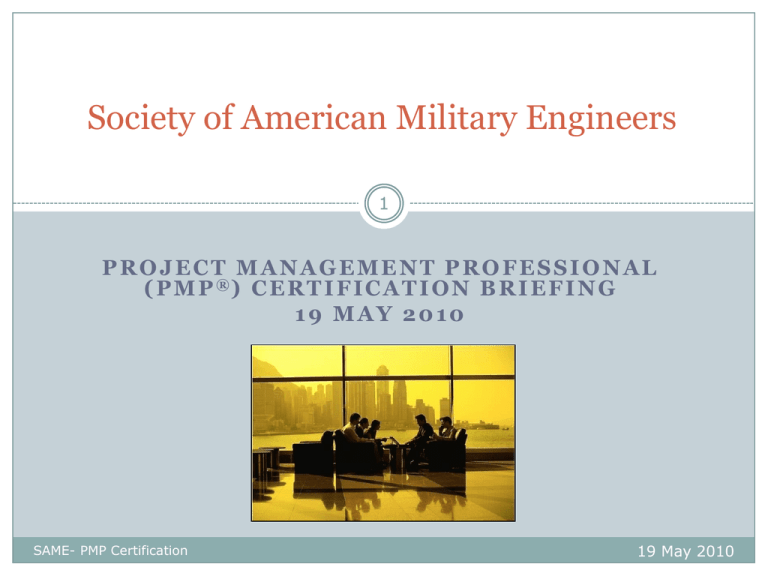
Society of American Military Engineers
1
PROJECT MANAGEMENT PROFESSIONAL
( P M P ®) C E R T I F I C A T I O N B R I E F I N G
19 MAY 2010
SAME- PMP Certification
19 May 2010
Agenda
2
Introductions
Overview
Project Management Institute (PMI)
PMI Family of Credentials
Why a PMP Credential?
PMP Qualifications
PMP Timeline
PMP Exam
Is It Worth Becoming a PMP?
Questions
SAME- PMP Certification
19 May 2010
Speakers
3
Mr. Dave Neeley, PMP
Mr. Mark Kuehl, PMP
SAME- PMP Certification
19 May 2010
4
A not-for-profit Professional Organization
Founded in 1969
317,962 members and 375,959 Active PMPs
250 chapters in over 70 countries
“Primary goal is to advance the practice,
science and profession of project
management throughout the world in a
conscientious and proactive manner so that
organizations everywhere will embrace,
value and utilize project management and
then attribute their successes to it.”
Contact: www.pmi.org
SAME- PMP Certification
19 May 2010
PMI Family of Credentials
5
SAME- PMP Certification
19 May 2010
Why a PMP Credential?
6
Government, commercial and other
organizations employ PMP certified project
managers in an attempt to improve the
success rate of projects in all areas of
knowledge, by applying a standardized and
evolving set of project management
principles.
Professionals obtain the credential to verify
their proficiency in project management
with an internationally accepted certificate.
Contracts may require that project
managers to be PMP® certified.
SAME- PMP Certification
19 May 2010
PMP Qualifications
7
Eligibility Requirements:
Secondary diploma (high school diploma)
5 years project management experience
with at least 7,500 hours spent leading and
directing project tasks and 35 hours project
management education
OR
Four-year degree (bachelor’s degree)
3 years project management experience
with at least 4,500 hours spent leading and
directing project tasks and 35 hours project
management education
SAME- PMP Certification
19 May 2010
Timeline of the PMP Credential Process
8
Application Submission Window
open 90 days
Application Completeness Review
5 business days
(when submitted online)
Audit Process
(if application is selected)
5 business days
Multiple-Choice
Examination Eligibility
1 year
(from the date of the application approval)
Applicant Payment Process
(cannot schedule exam until you submit
payment of credential fees)
Certification Cycle
3 years
(from the date the exam is passed to obtain
and report PDUs toward credential
maintenance)
Source: PMP Credential Handbook – revised August 2009
©2009 Project Management Institute Inc. All rights reserved.
SAME- PMP Certification
19 May 2010
Primary Body of Knowledge (PMBOK ®)
9
Is a recognized standard for the
project management profession that
describes the norms, methods,
processes and practices.
Evolved from the recognized good
practices of project management
practitioners who contributed to the
development of the standard.
SAME- PMP Certification
19 May 2010
PMP Exam
10
The PMP exam is based on six performance domains (five project management
process groups plus professional responsibility)*:
1. Initiating
2. Planning
3. Executing
4. Monitoring and Controlling
5. Closing
6. Professional and Social Responsibility
The Exam also covers nine project management knowledge areas (which have 42
processes)*:
1. Integration
2. Scope
* p. 43 PMBOK®
3. Time
4. Cost
5. Quality
6. Human Resource
7. Communications
8. Risk
9. Procurement
The exam consists of 200 multiple choice questions written against this
specification and must be completed in four hours.
SAME- PMP Certification
19 May 2010
Notional Test Questions
11
SAME- PMP Certification
19 May 2010
PMP Exam Preparation
12
Read PMBOK several times
Supplement reading with
Boot camp training and/or
Self study with other reference books
and/or on-line courses
According to PMI, the targeted rate
of success (i.e. percentage of
candidates passing vs. failing) is
low 70 percentile.
Candidates can take the test up to 3
times.
SAME- PMP Certification
19 May 2010
Case Study
13
Based on the salary increases experienced by IT professionals
with the PMP, this credential carries some clout and is
capturing great interest. Membership statistics from PMI
indicate that the Computers/Software/DP and IT industries are
the top two industry areas among PMI members, with about
15,000 and 12,000 members respectively in each industry
category.
In whatever way people prepare to become certified Project
Managers, the benefits are immeasurable to both the employee
and the employer. Employees are rewarded with increased
salaries, job promotions, and in general, better job prospects.
Employers who use PMPs are assured that they have hired
Project Managers who have a core competency in Project
Management and the requisite experience to perform as a
project manager. Studies have shown that projects managed by
people who are not certified Project Managers have only a 25%
chance of success, whereas projects run by those who are
knowledgeable in Modern Project Management tools and
techniques - as are people with the PMP certification - have a
75% success rate.
SAME- PMP Certification
19 May 2010
Is It Worth Becoming a PMP?
14
Salary: The PMP certification has a positive effect on the Project
Manager’s salary, as the average salary for PMP certified Project
Managers is currently above the $100K mark in the United States
(2009 statistics).
Market Demand: The demand for the PMP is big, and it’s growing
every day, and there is no sign that this demand will lessen in time.
In fact the demand has actually increased even with the 2008-2009
recession.
Prestige and Recognition: The PMP is still a prestigious
certification, with difficult eligibility criteria, a hard test, as well as
requiring constant maintenance (e.g. acquiring PDUs). The PMP
certification is highly regarded both in the United States and
internationally.
Increased Project Management Knowledge: Studying for the
PMP will help the applicant learn new Project Management concepts,
or understand concepts better.
SAME- PMP Certification
19 May 2010
Questions
15
Your Name Here
SAME- PMP Certification
19 May 2010


